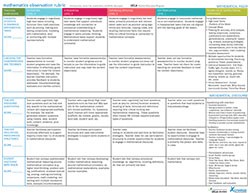The Power of Urban Teacher Residencies:
The Impact of IMPACT
Teacher Workroom
1. Secondary Math and Science Observation Frameworks
Secondary Math Observation Framework by Jaime Park, Imelda Nava, & Mollie Appelgate
Secondary Science Observation Framework by Imelda Nava, Jaime Park, & Mollie Appelgate
ABSTRACT
 The teacher observation rubrics were developed for observing pre-service teachers in UCLA’s urban teacher residency program within the Teacher Education Program. They focus on four aspects of teaching – content rigor, student discourse, equitable student access to content, and classroom ecology – and include examples of potential instructional strategies.
The teacher observation rubrics were developed for observing pre-service teachers in UCLA’s urban teacher residency program within the Teacher Education Program. They focus on four aspects of teaching – content rigor, student discourse, equitable student access to content, and classroom ecology – and include examples of potential instructional strategies.
OBSERVATION FRAMEWORKS
Secondary Math Observation Framework
Secondary Science Observation Framework
2. Using Feedback to Support Mentor Quality
Kelly Gallagher Nick & Carrie Usui-Johnson
ABSTRACT
In an effort to support mentor development, we examined mentors’ written feedback artifacts they gave to their novice teachers. Our goal was to examine mentors understanding of the feedback framework used in the program and understand how we could support mentor development.
READ THE ARTICLE
Using Feedback to Support Mentor Quality
3. Framing Teacher Learning Dispositions: A summer institute on special education
Helen Davis, LeeAnn Roca, & Jon Roos
ABSTRACT
One of the challenges of teacher preparation is to offer pre-service teachers the most current thinking in education and to have them incorporate this information into their practice. The authors developed a 4-day Institute for pre-service teachers entering our program to promote teaching dispositions conducive to social justice pedagogy and to an exploratory, co-learning model of teaching. We presented a perspective of learning in the context of a “classroom systems” model, in which the child’s learning is seen as a product of the classroom learning environment and coordination of special education strategies. In this paper, we discuss four themes of teacher dispositions, describe concrete examples from the institute, and discuss the implications of using a classroom systems model for teacher education.
READ THE ARTICLE
Framing Teacher Learning Dispositions: A summer institute on special education
